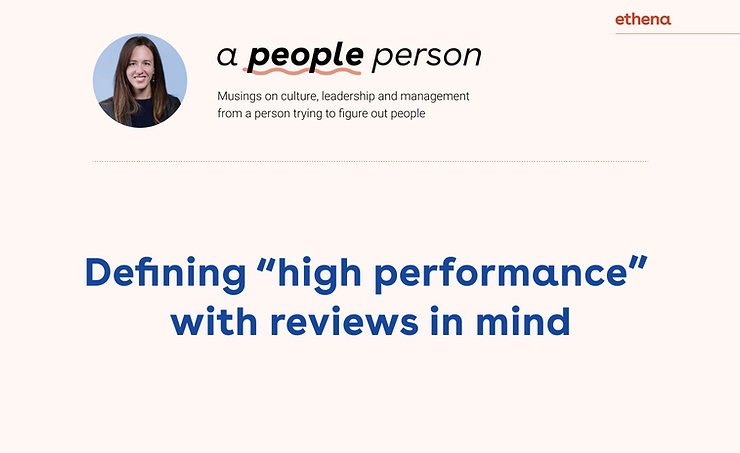Hi there,
While this is my last newsletter of 2022, it contains no predictions, highlights, or gift guides (just buy a gift card).
Instead, today I’m writing about being a good manager because in addition to being holiday season, for many, it’s performance review season.
First, I’ll share how I currently think of performance; then I’ll share some observations of where I’ve noticed people, myself included, struggling with these standards.
HIGH STANDARDS, CLEAR GROWTH, CAN’T LOSE
What you are managing to
I saw a quote that said, “Your company’s culture is the worst behavior that’s tolerated.” Of course, I can’t find it now, but it’s a helpful framing. Somehow, when you ask, “What can someone get away with,” it yields a more honest answer than, “What do we aspire to be.”
For example, in the Army, a lot of mediocre behavior was tolerated, especially during the wars when the Army was desperate for people. Unless you got a DUI while also being incredibly physically unfit, you were probably keeping your job. Now, there was a much higher standard for elite units or faster promotion, but that was on the opposite end of the spectrum.
At McKinsey, it was harder to tread water. The other big difference was that McKinsey’s performance standards were really about individual performance versus teams or leadership. I got the sense that McKinsey would tolerate poor leadership as long as the individual was phenomenal.
At Ethena, we had a perspective from our early days that we wanted to aim for talent density, meaning a smaller number of people who are high performers, and that we thought “not being an asshole” was a key part of high performance. This was one of our best decisions because it’s hard to unwind that culturally.
Now, ask any startup and they’ll likely say the same. No one says, “Bring me all the mediocre engineers, please.” So to make this more than just rhetoric, first we defined what we meant:
How we define “High Performance”
High performers get things done. They execute on their role efficiently and effectively.
- Autonomous
- Quick learners
- Feedback champions
- Self-aware and self-correct
- Responsible and accountable
- Team players
- Comfortable with ambiguity
- Action- and solution-oriented
High performers don’t do a “good” job. They do a “great” job. They are the dream candidate we would hire into the role if it opened today.
Temperature check: High performers make their managers’ job easier, not harder.
When this gets hard – doubt
Everything I’ve written so far is pretty straightforward. We want autonomous performers who are responsible team players. Got it. Where I’ve seen this go off the rails is when there’s doubt. Even a tiny bit of doubt can put some managers into a spiral where they start questioning themselves versus their report.
So thankfully, our VP of People, Melanie, put together some questions that I’ve seen be doubt-busters. My favorites are:
- Are they ultimately freeing up my time or making my job harder?
- If I were to open the role today, knowing what I know now about their performance, ability, and work ethic, would I hire them again? Are they the dream candidate for this role?
- What would happen if they turned in their resignation today? Would I panic or be relieved?
If you find yourself hemming and hawing, or if you’re coaching someone who is, I recommend using any of these three questions. Once you ask a manager, “Does Jim/Jane make your job easier?” you now have a very clear yes or no response to move forward with.
Now a topic for a different day is how I’ve seen gender interact with this question. I’m still putting together my own thoughts, but the reason I find this question helpful is women are often subtly socialized to think that it isn’t someone else’s job to make their jobs easier (see: motherhood). The Army added to my confusion because the Army has a concept of “servant leadership,” where leaders are meant to give their all for their teams.
But I think Melanie is right that it’s best for the individual and their team to define high performance standards and hold people accountable to them. It then means that your culture looks more like what you’ve defined in your values. And hopefully, less like a bunch of stuff you can get away with.
What I’m doing/reading/listening to:
I’ve been watching tech culture’s seemingly rapid shift with interest and two articles in particular caught my eye:
- This New Yorker article about a CEO/founder turned pundit and his “anti-woke” crusade
- This New York Times article (yes, a lot of New York love) about Elon Musk’s impact on tech CEOs getting to be who they want to be, with this quote in particular: “He says the things many C.E.O.s wish they could say, and then he actually does them,” said Roy Bahat, a venture capitalist with Bloomberg Beta.
Until next time,
Roxanne Petraeus
CEO & Co-founder, Ethena












